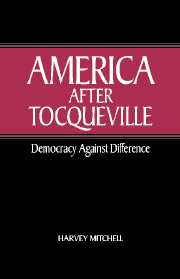Book contents
- Frontmatter
- Contents
- References to Tocqueville's Democracy in America
- Preface
- I PATHS TO DEMOCRACY IN AMERICA
- 1 Introduction: Thinking about American Democracy
- 2 Democracy's Experiment: From Inequality to Equality
- 3 Achieving a Democratic Civil Society
- II BEGINNINGS AND DEMOCRACY
- III AMERICAN DEMOCRACY ON TRIAL
- 10 Conclusion
- Works Cited
- Index
1 - Introduction: Thinking about American Democracy
Published online by Cambridge University Press: 10 August 2009
- Frontmatter
- Contents
- References to Tocqueville's Democracy in America
- Preface
- I PATHS TO DEMOCRACY IN AMERICA
- 1 Introduction: Thinking about American Democracy
- 2 Democracy's Experiment: From Inequality to Equality
- 3 Achieving a Democratic Civil Society
- II BEGINNINGS AND DEMOCRACY
- III AMERICAN DEMOCRACY ON TRIAL
- 10 Conclusion
- Works Cited
- Index
Summary
The United States presents the most pressing example of how democracy and modernity were and continue to be, in their most vital aspects, identified with one another. It is not only as if the one depends on the other. From the moment they were coupled, each imposed some considerable force upon, or at least challenged, the other to discover how they combined to shape thinking about civil and political society. There may be a sting hidden in the apparently benign design that binds them together. While people in many places in the world claim that they are laying both the foundations of democratic rule and reaping the benefits of modern market forces and technology, the evidence seems to contradict the claim that the second rests on the first. Indeed, the recent history of non-Western parts of the world reveals that capitalism, on the one hand, and Enlightenment ideas and values, including democratic forms and practices, on the other, can move in opposite directions. The lesson we might draw is that the expansion of democratic values, outside selected Western oriented societies, is more apparent than real. The real point in this book, however, is that they appear to exist as well in a beleaguered condition in the United States, which possesses the material resources and political traditions that at one time were believed to be immune from known, and as yet unknown, hostile forces.
- Type
- Chapter
- Information
- America after TocquevilleDemocracy against Difference, pp. 3 - 22Publisher: Cambridge University PressPrint publication year: 2002
- 1
- Cited by



